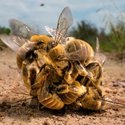The Phoblographer Monday October 17, 2022
As we recently noted, Fujifilm has announced that chemicals and paper will be facing a price increase. “If you don’t read their announcement carefully, you’d think it’s just the paper,” notes The Phoblographer. “And if it were just the paper, then you just wouldn’t order prints. But the news pertains to chemicals too. That’s bound to annoy a lot of us and, combined with the lack of regulation in pricing within the film photography world, it gets even more frustrating.”
Read the full Story >>
THE VERGE Monday October 17, 2022
Would you like to be composted when it’s your time to go? Natural organic reduction — better known as human composting — was first legalized in Washington state in 2019, and since then the process has proved popular among some of the Pacific Northwest’s eco-conscious consumers, notes The Verge, which takes you inside Return Home, one of the world’s first human composting facilities. The article includes photographs by Meron Menghistab. A deathcare revolution is underway, declares TV.
Read the full Story >>
CNET Monday October 17, 2022
Googles newest high-end smartphone, the Pixel 7 Pro, goes up against Apple and Samsung by zooming in on photography, notes CNET. The $899 Pixel 7 Pro’s main 50-megapixel camera can crop in for 2x zoom view and a 12.5-megapixel resolution photo, exactly as Apple’s iPhone 14 Pro can. Google uses the same idea with the Pixel 7 Pro's dedicated 48-megapixel telephoto camera. It ordinarily shoots at 5x zoom, but cropping the central pixels from the frame produces a 10x view and a 12-megapixel photo.
Read the full Story >>
Wildlife Photographer of the Year Monday October 17, 2022
There’s a lot of buzz about the overall winners of this year’s Wildlife Photographer of the Year competition: American photographer Karine Aigner takes the top prize for a photo of a "buzzing ball of cactus bees spinning over the hot sand on a Texas ranch.” All the bees in the ball—except for one—are males intent on mating with the single female bee at the center, explains the Natural History Museum in London, which sponsors the contest. Bees, adds the museum, are threatened by pesticides, climate change and habitat loss. See also: NPR.
Read the full Story >>




